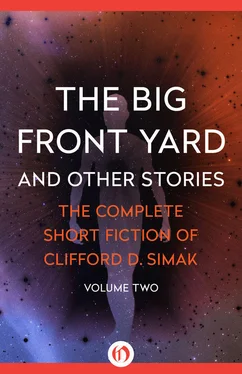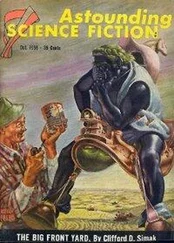The atmosphere was deadly. Deadly to what? The radiation lancing in from the B-type star was deadly and again, deadly to what?
What do I have to know, it wondered. And there was another word it had not used before. I. Me. Myself. An entity. A self. A single thing, standing all alone, no part of another. A personality.
What am I? it asked. Where am I? And why? Why must I go on collecting all this data? What care I for soil, or radiation, or the atmosphere? Why should I have to know what kind of star is standing overhead? I have no body that can be affected by any of it. I seem to have no form. I only have a being. A disembodied entity. A nebulous I.
It desisted for a time, unmoving, doing nothing, collecting no more data, only looking at the red and yellow of the planet, the purple of the flowers.
Then, after a time, it took up its work again. It touched the rocky outcrops on the hillside, found the planes that lay between the layers, seeped into the rock, following the cleavages.
Limestone. Massive, hard limestone. Put down millennia ago at the bottom of the sea.
It paused for a moment, vaguely disturbed, then recognized the cause of its disturbance. Fossils!
Why should fossils disturb it, it asked itself and then suddenly it knew with something that amounted to excitement, or as close as it could come to what might be excitement. These were not the fossils of plants, primordial ancestors to those purple plants growing on the present surface. These were animals – well-organized forms of life, sophisticated in their structure, well up the evolutionary ladder.
So few of the other planets had any life at all, the few that did more often than not had only the simplest of vegetable life or, perhaps, tiny organisms on the borderline, things that might be slightly more than vegetable, but not yet animal. I should have known, it thought. The purple plants should have alerted me. For they are highly organized; they are not simple plants. On this planet, despite its deadly atmosphere and it deadly radiation and its liquid that is not water, evolutionary forces still had been at work.
It traced one particular fossil. Not large. A chitin covering, apparently, but still it had a skeleton of sorts. It had a head, a body, legs. It had a flattened tail for swimming in whatever evil chemical brew the ocean might have been. It had jaws for seizing and for holding. It had eyes, a great many more eyes, perhaps, than it had any need of. There were faint tracings of an alimentary canal, fragments of nerves here and there that were still preserved, or at least the canals in which they ran had been preserved.
And it thought of that faint, misty time when he –
He? First an I. And then a he.
Two identities – or rather two terms of identity.
No longer an it, but an I and he.
He lay thin and spread out along the tight seams of the limestone and knew the fossils and pondered on them. Especially that one particular fossil and that other misty time in which the first fossil had been found, the first time he had ever known there was such a thing as fossil. He recalled the finding of it and recalled its name as well. It had been called a trilobite. Someone had told him the name, but he could not remember who it might have been. A place so faint in time, so far in space, that all he had left of it was a fossil called a trilobite.
But there had been another time and another place and he was not new – he had not in that first instant of awareness been turned on, or newly hatched, or born. He had a history. There had been times of other awarenesses and he had held identity in those other times. Not new, he thought, but old. A creature with a past.
The thought of eyes, of body, or arms and legs – could all of them be memories from that other time or times? Could there have been a time when he did have a head and eyes, a body?
Or could he be mistaken? Could all of this be a phantom memory fashioned out of some happening, or event, or some combination of happenings and events that had occurred to some other being? Was it, perhaps, a misplaced memory, not of himself, but of something else? If the memory should prove to be his own, what had happened to him – what changes had been made?
He forgot the limestone and the fossils. He lay spread out in the fissures of the rock and stayed quiet and limp, hoping that out of the limpness and the quietness he might devise an answer. A partial answer came, an infuriating answer, unspecific and tantalizing. Not one place, but many; not one time, but many times. Not on one planet, but on many planets spaced over many light-years.
If all of this were true, he thought, there must be purpose in it. Otherwise, why the many planets and the data on those planets? And this was a new, unbidden thought – the data on the planets. Why the data? For what purpose was it gathered? Certainly not for himself, for he did not need the data, had no use for it. Could it be that he was only the gatherer, the harvester, the storer and communicator of the data that he gathered?
If not for himself, for whom? He waited for the answer to come welling up, for the memory to reassert itself, and in time he realized that he had gone groping back as far as he could go.
Slowly he withdrew from the rock, once more was upon the hillside above the red land beneath the yellow sky.
A portion of the nearby surface moved and as it moved, he saw that it was not a portion of the surface, but a creature that had a coloration which made it seem to be a part of the planet’s surface. It moved quickly, as if a shadow had brushed along and blurred the surface. It moved in short and flowing motions, and when it stopped its motion it became a part of the surface, blending into it.
It was watching him, he knew, looking him over, although what there was to see of him he could not imagine. Sensitive, perhaps, to another personality, to another thing that shared with it that strange and undefinable quality which made up life. A force field, he wondered – was that what he was, a disembodied intelligence carried in a force field?
He stayed still so the thing could look him over. It moved in its short, flowing dashes, all around him. It left a furrowed track behind it, it kicked up little spurts of sand as it made its dashes. It moved in closer.
And he had it. He held it motionless, wrapped up as if he held it in many hands. He examined it, not closely, not analytically, but only enough so he could tell what kind of thing it was. Protoplasmic and heavily shielded against the radiations, even designed, perhaps – although he could not be sure – to take advantage of the energy contained in the radiation. An organism, more than likely, that could not exist without the radiations, that needed them as other creatures might need warmth, or food, or oxygen. Intelligent and laced with a multitude of emotions – not, perhaps, the kind of intelligence that could build a complex culture, but a high level of animal intelligence. Perhaps still evolving in its intelligence. Give it a few more million years and it might contrive a culture.
He turned it loose. It flowed away, moving rapidly, straight away from him. He lost sight of it, but still could follow its movement for a time by its unreeling track and the spurts of sand it kicked into the air.
There was much work to do. an atmospheric profile, an analysis of the soil and of the micro-organisms that it might contain, a determination of the liquid in the brook, an examination of the plant life, a geological survey, measurement of the magnetic field, the intensity of the radiation. But first there should be a general survey of the planet to determine what sort of place it was, a pin-pointing of those areas that might be of economic interest.
And there it was again, another word he had not had before. Economic.
Читать дальше












